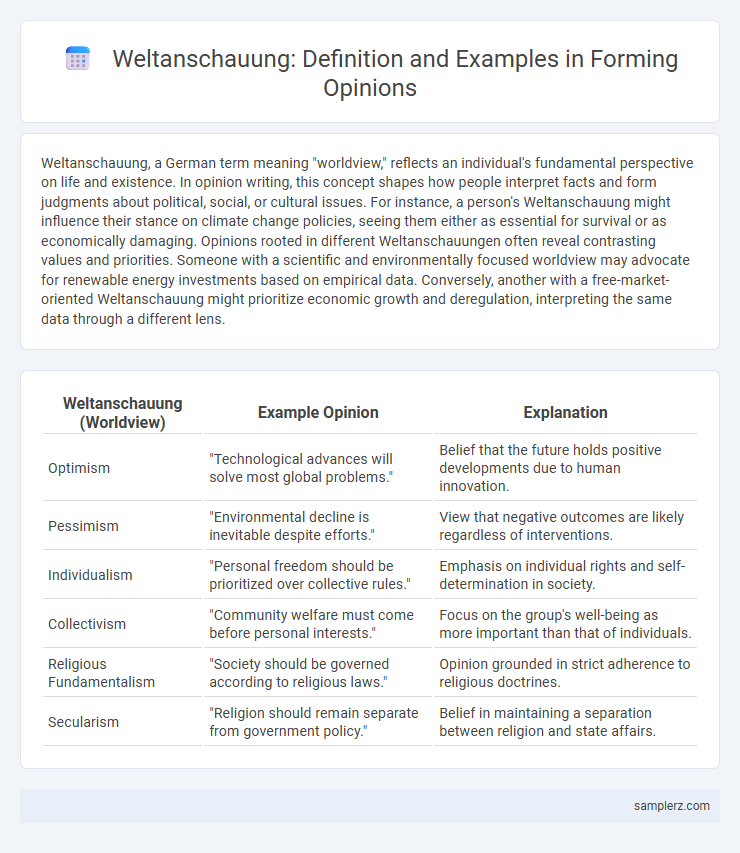Weltanschauung, a German term meaning "worldview," reflects an individual's fundamental perspective on life and existence. In opinion writing, this concept shapes how people interpret facts and form judgments about political, social, or cultural issues. For instance, a person's Weltanschauung might influence their stance on climate change policies, seeing them either as essential for survival or as economically damaging. Opinions rooted in different Weltanschauungen often reveal contrasting values and priorities. Someone with a scientific and environmentally focused worldview may advocate for renewable energy investments based on empirical data. Conversely, another with a free-market-oriented Weltanschauung might prioritize economic growth and deregulation, interpreting the same data through a different lens.
Table of Comparison
| Weltanschauung (Worldview) | Example Opinion | Explanation |
|---|---|---|
| Optimism | "Technological advances will solve most global problems." | Belief that the future holds positive developments due to human innovation. |
| Pessimism | "Environmental decline is inevitable despite efforts." | View that negative outcomes are likely regardless of interventions. |
| Individualism | "Personal freedom should be prioritized over collective rules." | Emphasis on individual rights and self-determination in society. |
| Collectivism | "Community welfare must come before personal interests." | Focus on the group's well-being as more important than that of individuals. |
| Religious Fundamentalism | "Society should be governed according to religious laws." | Opinion grounded in strict adherence to religious doctrines. |
| Secularism | "Religion should remain separate from government policy." | Belief in maintaining a separation between religion and state affairs. |
Defining Weltanschauung in Opinion Pieces
Weltanschauung in opinion pieces refers to the comprehensive worldview shaping a writer's perspective, influencing how they interpret events and express judgments. This underlying framework encompasses cultural, ideological, and philosophical beliefs that color the arguments and tone within opinion articles. Clear articulation of one's Weltanschauung provides readers with insight into the context behind opinions, enhancing their understanding of the argument's foundation.
How Weltanschauung Shapes Personal Perspectives
Weltanschauung, or worldview, fundamentally shapes how individuals interpret experiences, influencing their opinions on social, political, and cultural issues. This comprehensive framework, derived from cultural background, education, and personal values, filters information and frames judgments, leading to diverse perspectives on identical events. Recognizing the role of Weltanschauung in opinion formation highlights the subjective nature of viewpoints and the importance of considering multiple worldviews for a balanced understanding.
Historical Examples of Weltanschauung in Editorials
Historical editorials often reflect distinct Weltanschauungen by framing significant events through cultural and ideological lenses, such as Cold War-era newspapers emphasizing the clash between capitalism and communism. These opinion pieces reveal how collective worldviews shape public perception and influence political discourse by presenting reality according to prevailing ideological narratives. Examining editorials from major historical moments, like the post-World War II reconstruction or the civil rights movement, illustrates how Weltanschauung drives interpretation and opinion formation in media.
The Role of Cultural Background in Weltanschauung
Cultural background shapes an individual's Weltanschauung by influencing their core values, beliefs, and perceptions of reality. For example, collectivist societies often prioritize community well-being and social harmony, shaping a worldview that emphasizes interdependence and cooperation. This cultural lens profoundly affects opinions on social policies, ethical norms, and individual responsibilities.
Weltanschauung and Political Opinion Formation
Weltanschauung, or worldview, fundamentally shapes political opinion formation by influencing how individuals interpret social, economic, and cultural information. This cohesive set of beliefs and values filters political messages, guiding attitudes toward policies, parties, and leaders. Understanding a person's Weltanschauung offers vital insight into the roots of their political preferences and ideological alignments.
Weltanschauung’s Influence on Social Commentaries
Weltanschauung shapes social commentaries by providing a foundational worldview that influences how societal issues are interpreted and discussed. This underlying perspective colors opinions on topics such as justice, equality, and governance, guiding the moral and ethical lens through which commentators analyze social phenomena. Consequently, diverse Weltanschauungs result in varied narratives and critiques within public discourse, impacting policy debates and cultural understanding.
Contrasting Weltanschauungs in Modern Debates
Contrasting Weltanschauungs often shape modern debates, such as the conflict between individualism and collectivism in political discourse. These fundamentally different worldviews influence opinions on policy, societal roles, and personal freedoms. Understanding these diverse perspectives is crucial for navigating contemporary discussions and fostering meaningful dialogue.
Personal Experience: A Case Study in Weltanschauung
Personal experience shapes an individual's Weltanschauung by influencing their perceptions, values, and interpretations of the world around them. For example, someone who has faced significant hardship may develop a more pessimistic or resilient worldview, while positive experiences can foster optimism and openness. This case study highlights how experiential factors distinctly mold subjective reality and inform broader philosophical outlooks.
Media Representation of Weltanschauung in Opinions
Media representation of Weltanschauung in opinions shapes public perception by framing cultural and ideological worldviews through selective narratives and imagery. Opinion pieces often reflect and reinforce underlying value systems, influencing audience attitudes by emphasizing specific global perspectives and social identities. These portrayals can either challenge or perpetuate dominant paradigms, highlighting the power of media in constructing collective understanding.
Navigating Conflicting Weltanschauungs in Dialogue
Navigating conflicting Weltanschauungs in dialogue requires recognizing the underlying belief systems that shape each participant's worldview, which influences their interpretation of facts and values. Effective communication arises from acknowledging these diverse perspectives without attempting to impose one's own, fostering mutual understanding and respectful exchange. Engaging empathetically with differing frames of reference can transform disagreement into an opportunity for deeper insight and collaborative problem-solving.

example of Weltanschauung in opinion Infographic
 samplerz.com
samplerz.com